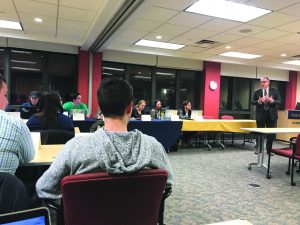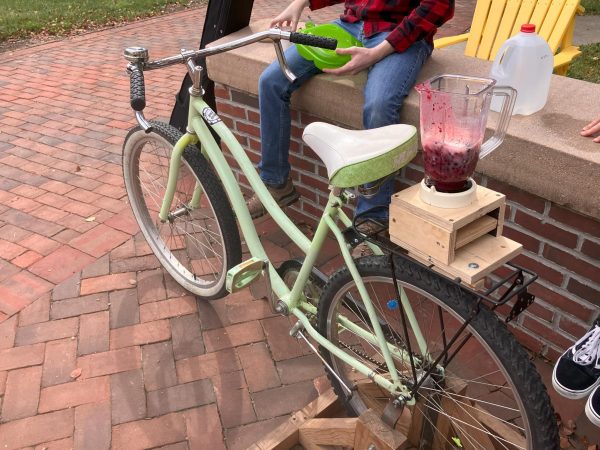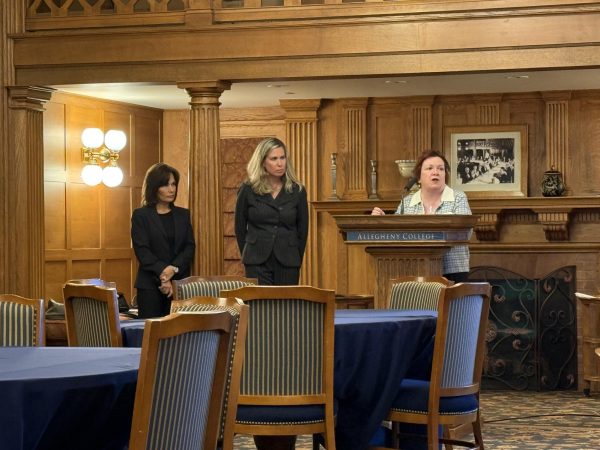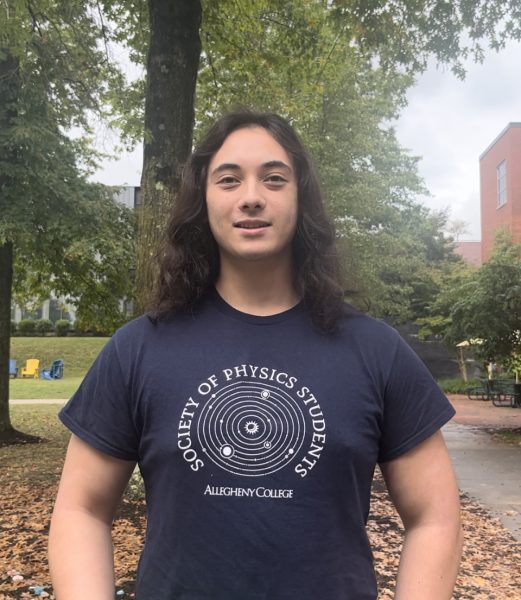Mullen and Petula look to the future at weekly ASG meeting
Allegheny Student Government discussed the Allegheny Strategic Action Plan during their meeting on Tuesday, Nov. 7. Allegheny College President James Mullen and Executive Vice President Eileen Petula visited ASG to explain the plan.
“This is an exciting time for us, and it’s a time that we really have to grasp and run with,” Mullen said. “As you know, across the country, folks are questioning what the liberal arts are really all about.”
In response to that questioning, Allegheny created ASAP, according to Mullen.
“What we’re trying to do with the Allegheny Strategic Action Plan is get ahead of all of that,” Mullen said. “Really define our own destiny.”
Allegheny’s Board of Trustees met in February of 2016 to plan ASAP, according to Mullen. Mullen said Allegheny is essentially all about the student experience.
“It’s all about making sure every student who comes to Allegheny is going to enjoy the experience … and [preparing] you for the multiple careers that you will probably have in the world ahead,” Mullen said. “Third, [preparing] you to be meaningful citizens in the world you inherit, to deliver a rich and meaningful life.”
Upon deciding Allegheny’s purpose, the board of trustees formed three working gro

Allegheny College President James Mullen addresses Allegheny Student Government during its general meeting on Tuesday, Nov. 7, 2017, in the George M. Henderson Campus Center.
ups in June and defined Allegheny’s future, according to Mullen. Mullen said the groups looked at the future of enrollment, Allegheny’s programs and the facilities on campus as aspects they wanted to include in ASAP.
“The groups found … this a very rigorous college,” Mullen said. “It’s really important that there are students who can succeed in that rigorous environment. We want to be … fair but rigorous.”
Since the groups also discussed Allegheny’s programs, the school is going to add women’s field hockey and men’s lacrosse to their list of official sports, according to Mullen. The addition of these sports likely means a new field will be built, Mullen said.
Another program Allegheny hopes to begin is the futures program, which will link the school’s liberal arts program to the world students will inherit, according to Mullen. Mullen used the pre-med track as an example of how the futures program will enhance the curriculum.
“For example, we can fold the health coaching program into the curriculum, and help you use that as an asset in medical school,” Mullen said. “[We want to] create other internship opportunities, to create other interdisciplinary opportunities.”
An aspect of ASAP that affects Allegheny staff was just announced on Friday, Nov. 3, according to Petula. The early retirement packages were released, and about 100 members of Allegheny’s staff, including both tenured and non-tenured professors, are eligible, Petula said. She said the retirement package requires 15 years of continuous service and that the applicant is at least 56. The package will open later in November, according to Petula.
“The goal is to preserve the breadth and depth of our curriculum,” Petula said. “The provost … may have to fill in in order to continue to meet the needs of our very rich curriculum.”
As ASAP is implemented, Mullen said he wants as much input as he can get from students and administration since there is a lot of energy and excitement surrounding the plan.
“Here’s what happens when there’s a lot of energy: there’s some uncertainty,” Mullen said. “But we’re working through that process. We’re working through the uncertainty right now, but that can be part of the excitement.”
The funds for ASAP comes from the board of trustees, according to Mullen.
“They received the presentations about the things we want to do, and they voted $10 million for phase one of the action plan,” Mullen said. “It’s a sign of the commitment the board has and the potential they see here.”
In addition to the $10 million ASAP received, Allegheny’s endowment has recently passed $210 million, according to Mullen.
Mullen finished his presentation with a comment on what he hopes to see in Allegheny’ future.
“We’re looking for all the ways we can better help a student thrive at Allegheny. We want to continue to augment the programs that support you once you arrive,” Mullen said. “The last thing I want is for a student to come here and not to succeed academically.”
After Mullen and Petula finished talking to ASG, Jesse Tomkiewicz, ’20, asked for approval of his club, Allegheny Veteran’s Service. The club will be run by Tomkiewicz and John Fazio, ’20, according to Tomkiewicz.
Tomkiewicz said he and others interested in the club have been visiting Lilac Springs, a resort for combat veterans to relax, for the past five weeks.
“We started this because we wanted to help local veterans,” Tomkiewicz said. “We thought this would be a really cool thing to do, especially since I’m vice president for College Democrats and [Fazio] is the president for College Republicans, and it’s a nice thing to be co-presidents. It’s something really all people should be able to agree on doing this kind of service.”
Allegheny Veteran’s Service was approved by a vote of the senate. The club plans to pursue other things to do in the community that could coincide with events, such as Veteran’s Day, as well as bring awareness to campus, according to Tomkiewicz.
“We [want to] show that we do care,” Tomkiewicz said. “We want to bring something to campus as well to show we have appreciation for the things that they’ve done.”





